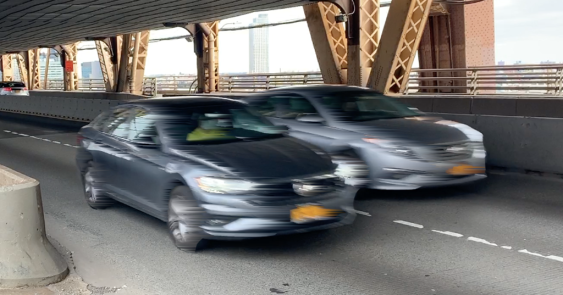Acting under a Supreme Court mandate, the Environmental Protection Agency (EPA) ruled today that greenhouse gas emissions endanger public health and contribute to the harmful environmental effects of climate change, paving the way for pollution regulations under the Clean Air Act.
"Today, EPA announced that greenhouse gases threaten the health and
welfare of the American people," EPA chief Lisa Jackson said at a press conference (audio available here). "We also found that greenhouse gas
emissions from on-road vehicles contribute to that threat."
The EPA's ruling, also known in Washington as an "endangerment finding," clears the way for the agency to play a role in implementing new auto fuel-efficiency standards released by the White House in September.
Vehicles are the No. 2 contributor to total U.S. greenhouse gas emissions, the EPA said today, with electricity generation taking the top spot. "U.S. emissions from on-road vehicles are also greater than the total greenhouse gas emissions from every other individual nation, with the exception of China, Russia, and India," the EPA said in a release on its ruling.
But given that the "endangerment finding" has been in the works at the EPA since the earliest days of the Obama administration, what does today's announcement mean for the future of climate change legislation?
In the Senate, where a climate bill that would direct hundreds of billions of dollars to clean transportation remains mired in political maneuvering, Democrats aimed to use the EPA ruling to spur their slow process forward.
"The message to Congress is crystal clear: get moving," Sen. John Kerry (D-MA), the climate measure's chief sponsor, said in a statement. Kerry added:
If Congress does notpass legislation dealing with climate change, the administration is more than justified to use the EPA to impose new regulations. Imposed regulationsby definition will not include the job protections and investment incentives weare proposing in the Senate today.
If the EPA ultimately steps into the emissions-regulating role that Congress aims to play with its climate bill, there would be little chance of survival for grant programs dedicated to funding transit, local land-use planning, and other transportation planning goals.
In her own statement on the EPA ruling, Senate environment committee chairman Barbara Boxer said:
It is now clear that if we take our responsibilityseriously to protect and defend our people from this threat, the Senate has aduty to act on climate change legislation that includes major components of thework done by the Energy and Environment Committees.
Still, the next step in climate legislation is unlikely to occur before January or February, when the Senate Finance Committee, headed by environmental fence-sitter Max Baucus (D-MT), is expected to hold its first votes on language that determines how to distribute revenue generated from future emissions limits.
(ed. note. More information on today's EPA ruling, including information specific to auto fuel-efficiency, can be found here.)





